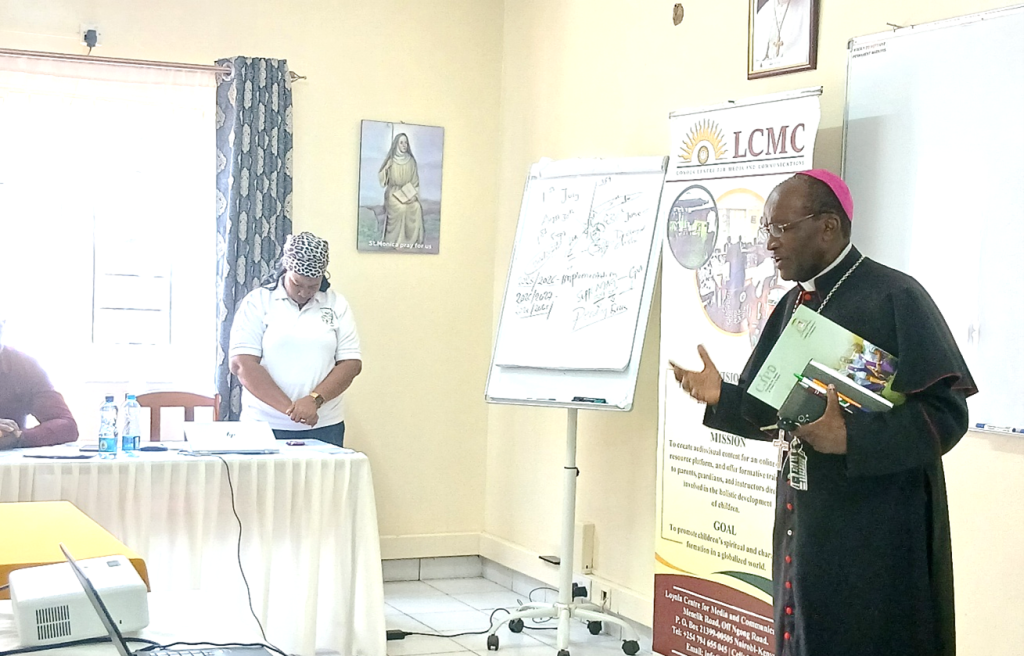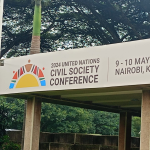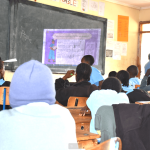By Sr. Lydia Mukari

The Loyola Centre for Media and Communications (LCMC), in partnership with the Catholic Archdiocese of Mombasa, has rolled out a bold county-wide campaign to advocate for equitable distribution of bursary funds to all deserving students. Operating under the theme “Pesa Sawa, Haki Kwa Wote”, the initiative aims to ensure that education funds in Mombasa County are allocated fairly and transparently to deserving students.
The campaign stems from the 2019 anti-corruption campaign by the Catholic Bishops, Breaking the Chains of Corruption and zeroes in on bursary committees, with a goal of mobilizing at least 10,000 citizens by January 2026 to participate actively in oversight and accountability. LCMC is leading the facilitation, focusing on civic education, community engagement and the amplification of citizen voices.
Speaking during a two-day workshop at the Mother of Africa Pastoral Centre in Tudor, Catholic Justice and Peace Department (CJPD) coordinator Lilian Japani said the initiative’s primary aim is to equip residents with the knowledge needed to track bursary processes and challenge irregularities.
“Our goal is to empower citizens with knowledge to understand what bursaries are, who rightfully qualifies, and how to hold decision-makers accountable,” she said. “No deserving student should be denied, and every denial should come with a clear explanation,” she added.

Archbishop Martin Kivuva Musonde of the Catholic Archdiocese of Mombasa reminded CJPD members of their role as advocates. “If we leave things to happen on their own, they will not happen,” he stated. “We need advocates, and as CJPD, we are an advocacy organ. Our campaign is not about voting for one and leaving another, it is about pushing for good leaders.”
The LCMC-led strategy will directly engage those most affected by bursary allocation: parents, students, past and present beneficiaries. Testimonies will form a central part of the campaign, putting a human face to the problem and inspiring improvement.
To maximize impact, faith leaders, civic influencers, bursary board members, and media professionals will help spread the message via community barazas, radio programs, SMS outreach, religious gatherings, posters, banners, school events, music festivals, and drama performances.
LCMC also plans to collect bursary-related testimonials and train citizens on vetting processes to create a strong grassroots movement for fairness in educational funding.
During the workshop, Samantha Kodhek from the Mombasa Office of the Ombudsman highlighted the legal requirement under the Access to Information Act, 2016 for public entities to disclose information.
“Proactive disclosure is where the government actively provides information to the people, while reactive disclosure is where information is given upon request,” she explained. “Citizens have a right to both. Openness in bursary allocation is not optional, it is a constitutional obligation.”

Public finance expert Cerullo Masha from Bajeti Hub reminded participants that budgeting is more than an administrative process, it is a policy tool that reflects development priorities. “The budget is a mirror of the government’s priorities,” Masha said. “Once you know the budget cycle and key documents, you can tell whether bursary money is being used properly or diverted. Knowledge is the first step to action.”


To illustrate how corruption thrives, Dennson Machuki from LCMC explored the concept of the fraud triangle, explaining how pressure and other motivating factors place Kenyans in difficult situations, leaving them with limited opportunities to refuse a bribe. All too often, individuals end up engaging in corrupt practices or participating in fraud, only to later find ways to justify their actions, even in the face of their own conscience’s judgement.
With its blend of civic education, storytelling, and community engagement, ‘‘Pesa Sawa, Haki Kwa Wote’ seeks to make Mombasa a national example of how grassroots oversight can fight corruption starting with the future of its students.





